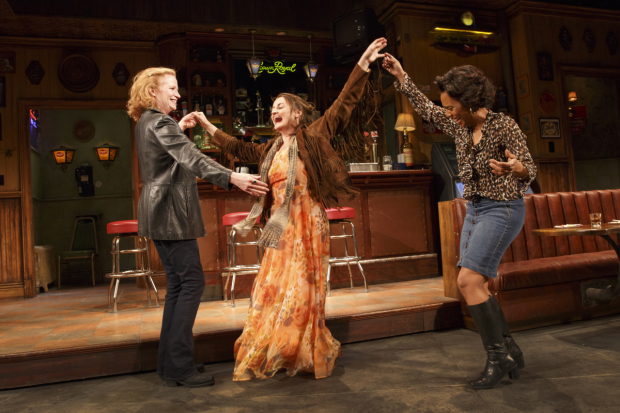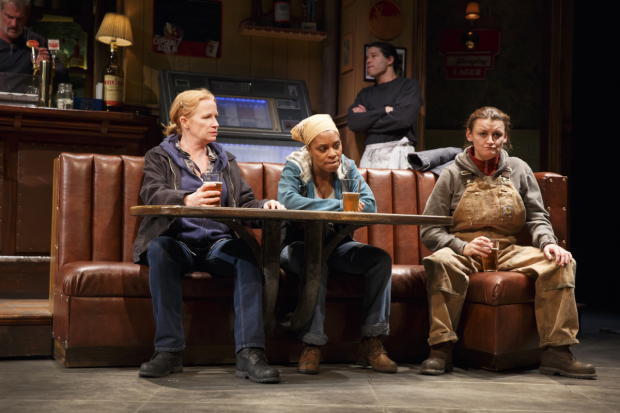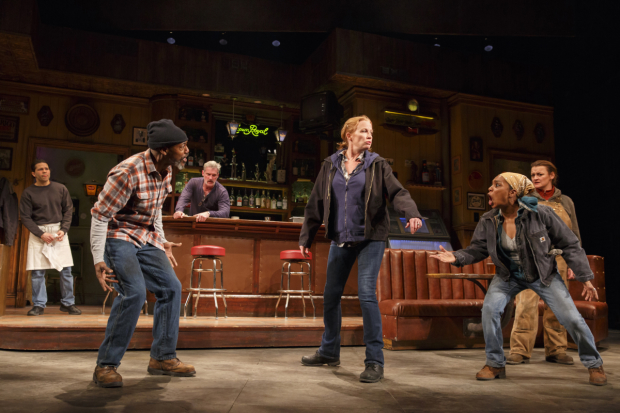Sweat
Lynn Nottage’s drama about the collapse of the industrial middle-class transfers to Broadway.

(© Joan Marcus)
When was the last time America was great? A good argument could be made for the turn of the millennium, a time of relative peace and prosperity. The dot-com boom had yet to go bust. The Soviet Union had fallen, but the Twin Towers had not. The 21st century seemed to hold boundless promise in what Francis Fukuyama deemed "the end of history," meaning the ultimate triumph of liberal democracy. Yes, about that…
Several new plays are now examining this heady and myopic time, chief among them Sweat, Lynn Nottage's incisive look at the nascence of our current discontent through the microcosm of a group of factory workers in Reading, Pennsylvania. The play had a critically acclaimed run last fall at the Public Theater, where its coincidence with the presidential election seemed to give Nottage (the Pulitzer Prize-winning author of Ruined) a Cassandra-like prescience. It still packs a punch in the larger Studio 54, but the actors work up a palpable sweat getting it to land.

(© Joan Marcus)
Cynthia (Michelle Wilson), Tracey (Johanna Day), and Jessie (Alison Wright) are best friends who have worked at the Olstead steel tubing plant since they graduated high school. Tracey's son Jason (Will Pullen) and Cynthia's son Chris (Khris Davis) are also best friends employed at Olstead's. After work, they all like to unwind at their favorite dive, where former Olstead worker Stan (an avuncular James Colby) has tended bar since an injury took him off the line. Proud union men and women all, their families have lived and worked in Reading for generations; but it's the year 2000 and change is in the air.
We learn that Olstead's is looking to hire someone off the floor to join management. Cynthia (who is black) gets the job over Tracey (who is resentful). Oscar (Carlo Albán), the Colombian-American bar-back, just saw a job posting for Olstead's (printed exclusively in Spanish). Cynthia's ex, Brucie (John Earl Jelks), floats in and out of the bar like the ghost of Christmas future: He's been locked out of his textile job for almost two years and has spent that time developing a drug addiction. We know that none of this will end well, especially since Nottage frames her story with flash-forward scenes set in 2008. By then, everything feels irrevocably broken.
Without ever setting a scene in a corporate board room, Nottage exposes the insidious divide-and-conquer strategy that has devastated so much of America's industrial workforce: Tribal divisions within the labor force are exploited and irritated, resulting in a race to the bottom vis-à-vis wages and benefits. We can see that race in Day's face as she gives the desperate performance of a woman who is losing, gasping for air as thousands pass her on the way to the finish line.
All of the performances feel bigger, suggesting that director Kate Whoriskey has instructed her cast to play to the back row of this much larger Broadway house. Unfortunately, results vary: Pullen and Davis, who so acutely captured the combustible mix of testosterone and alcohol in the off-Broadway run, here regularly verge on a hollow performance of masculinity. Similarly, Wilson twists her face to affect a kabuki-like mask, telegraphing inauthentic rage.

(© Joan Marcus)
Happily, Jelks' performance has become both larger and more intimate. His frame seems to physically wither as a once-roaring voice diminishes to a raspy meow over the course of two hours. By the end of the play, he looks like a man flattened by a steamroller.
Global politics and finance infiltrate the space in the form of Jeff Sugg's well-curated projections, with Rob Milburn and Michael Bodeen's alarming sound design augmenting the experience: The Wall Street Bell clangs, signifying unprecedented gains, which are inevitably followed by a painful crash. The face of George W. Bush flickers across the set as a disembodied voice warns that unless the big banks receive a $700 billion cash infusion, the global economy will collapse. That bailout happened, but no one rescued Reading, the decay of which is painfully visible in Sugg's transition videos.
In addition to providing detailed spaces and rapid transitions, John Lee Beatty's rotating set also holds out the scantest hope for renewal: In the final scene, bottles of wine and food menus have taken up residency in what was previously just a beer and whiskey sort of establishment. The bar has become a college hangout, signifying the propensity for reinvention in American business. Still, we can't help but walk away with the nagging suspicion that the college kids who frequent this repurposed watering hole have no relation to the blue-collar workers laid off at Olstead's. In the bar's orderly selection of Malbec, we can see this country's class divisions widening.

(© Joan Marcus)
Even though some of the performances have gone astray, Sweat is still the must-see play of the season. Nottage employs her ample intelligence and compassion in telling the story of why so many Americans feel frustrated and frightened by a rapidly shifting economy that no longer seems to have room for them. Everyone ought to listen up.











